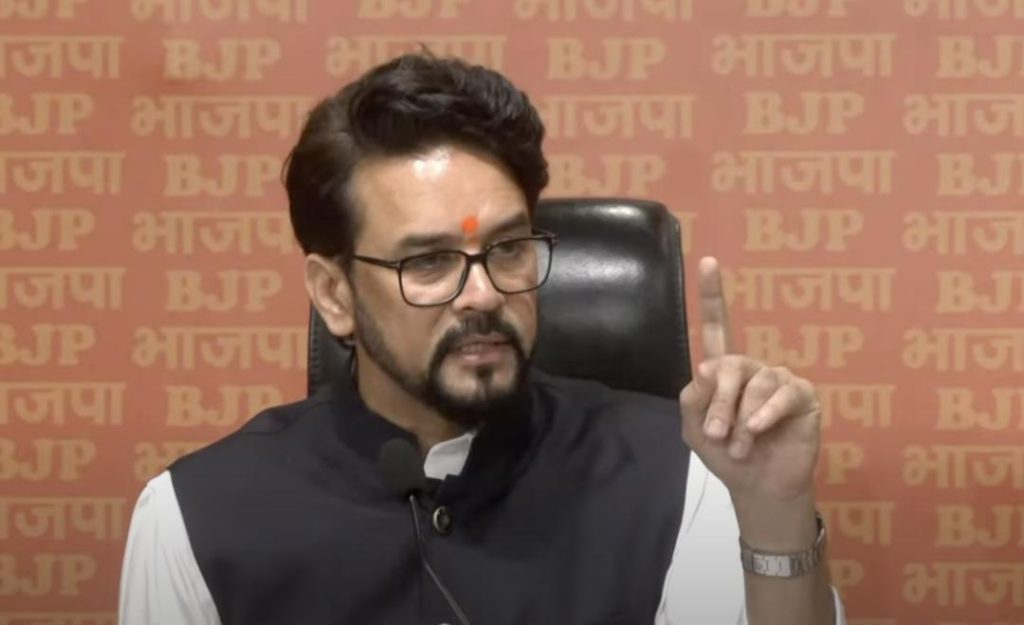
Congress & CPI made Bhimrao Ambedkar lose the poll in 1952: BJP
The Indian general election of 1952 was a historic event that marked the beginning of parliamentary democracy in the country. However, the election also saw the defeat of one of India’s most iconic leaders, Dr. Bhimrao Ambedkar, at the hands of the Congress and the Communist Party of India (CPI). In a recent statement, BJP MP Anurag Thakur highlighted the role of the Congress and CPI in Ambedkar’s defeat, stating that they laid the foundation for electoral corruption in the very first election.
Thakur’s comments came during a discussion on the need to reform the electoral system in India. He pointed out that the 1952 election was a significant event that set the tone for future elections in the country. “The Congress and CPI together defeated Dr. Bhimrao Ambedkar, a constitution maker and saint-like leader, in the election,” Thakur said.
According to Thakur, the election was marred by irregularities and corruption, which led to a significant number of votes being rejected. “74,333 votes were rejected,” he noted. “The Congress ensured that a constitution maker, a Dalit leader, was eliminated in the very first election.”
Ambedkar’s defeat in the 1952 election was a surprise to many, given his importance in the Indian independence movement and his role in drafting the Indian Constitution. He was a key figure in the struggle for Dalit rights and was instrumental in the passage of the Untouchability Offences Act in 1955.
Thakur’s comments have sparked a debate about the role of the Congress and CPI in Ambedkar’s defeat. While the exact circumstances of his defeat are still disputed, there is no doubt that the 1952 election was marked by widespread irregularities and corruption.
The 1952 election was the first general election to be held in India after independence. It was a significant event that marked the beginning of parliamentary democracy in the country. The election was held over a period of several weeks, with voters casting their ballots in over 200,000 polling stations across the country.
However, the election was marred by irregularities and corruption, which led to a significant number of votes being rejected. According to official records, 74,333 votes were rejected, which was a significant percentage of the total votes cast.
The defeat of Ambedkar in the 1952 election was seen as a major setback for the Dalit community. Ambedkar was a powerful symbol of Dalit empowerment and his defeat was seen as a blow to the community’s hopes for greater representation in Indian politics.
In recent years, there has been a growing recognition of Ambedkar’s importance in Indian history. He is now widely regarded as one of the most important figures in Indian politics, and his legacy continues to inspire Dalit activists and intellectuals around the world.
The BJP’s criticism of the Congress and CPI for Ambedkar’s defeat is part of a broader effort to rebrand itself as the champion of Dalit rights. The party has been seeking to capitalize on the growing popularity of Ambedkar among Dalits, who are increasingly frustrated with the lack of representation and opportunities in Indian society.
However, the BJP’s claims of Congress and CPI wrongdoing have been disputed by many, who argue that Ambedkar’s defeat was the result of a combination of factors, including his own mistakes and the complex political dynamics of the time.
In conclusion, the defeat of Dr. Bhimrao Ambedkar in the 1952 election was a significant event that marked the beginning of electoral corruption in India. The Congress and CPI laid the foundation for future electoral irregularities, which continue to plague Indian politics today.
As Thakur noted, Ambedkar’s defeat was a blow to the Dalit community and a setback for their hopes for greater representation in Indian politics. However, the legacy of Ambedkar continues to inspire Dalit activists and intellectuals around the world, and his importance in Indian history is now widely recognized.
Source: https://youtu.be/0kLyW5rSJSg






